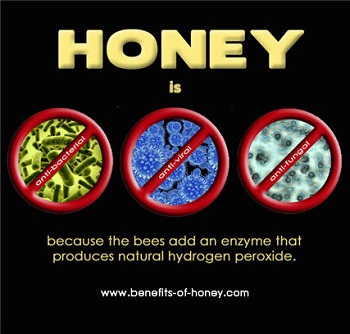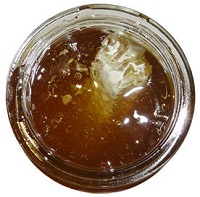
3 Key Valuable Honey Properties
Be pleasantly surprised by these amazing honey properties -- antimicrobial, antioxidant, and hygroscopic which all explain why honey is not only a popular food but also a well sought after medicine.
1. Honey is Hygroscopic
Honey has a hygroscopic nature, which means when exposed to air, it naturally absorbs moisture in from the air. In treating open wounds, honey is useful as it could help prevent scarring by keeping the skin moist, encourage the growth of new tissues, and allow easy removal of any dressing by preventing dressing from becoming stuck to the skin.
Honey's hygroscopic properties also make it an ideal ingredient in a lot of cosmetics as it helps keep skin hydrated and fresh and prevents drying. Thus, some people call honey a natural "humectant" as it attracts and retains moisture. When used in skin and hair treatments, honey trap and seal in the moisture leaving skin soft and supple, and hair glossy and healthy.

2. Honey is Antibacterial
Researchers began to document the healing properties of honey in the early part of the 20th century. This ceased with the development of antibiotics but recently the development of resistance to antibiotics has led to a resurgence of interest into the healing properties of honey (Asian Pacific Journal of Tropical Biomedicine 2011 Apr; 1(2): 154�160). The effective antimicrobial agent in honey prohibits the growth of certain bacteria. It contains an enzyme that produces hydrogen peroxide which is believed to be the main reason for the antimicrobial activity of honey. As such, honey is a useful treatment for wounds and scalds. Cuts, abrasions and scalds can be covered in honey to prevent bacteria from entering the wound and promote healing.
Honey can help treat minor acne by attacking the bacteria that cause the outbreaks while moisturizing the skin to aid rejuvenation. Types of honey differ greatly in their antimicrobial potency, varying as much as a hundred fold. Honey derived from the Manuka bush, found in abundance in New Zealand, claims the highest potency of such antimicrobial properties.
Read more in: Honey the Tastiest Antibiotic.
3. Honey is a Source of Antioxidants
Honey contains natural antioxidant properties that can destroy biologically destructive chemical agents which have been linked to many diseases such as cancer.

Studies also found that dark-colored honeys such as Buckwheat seem to possess more antioxidants than light-color varieties. Not only could honey's antioxidants help to eliminate free radicals in the body, they are also part of the nutrient supply for growth of new tissue. These precious honey properties help protect the skin under the sun and help the skin to rejuvenate and stay young-looking. As such, there have been an increasing number of manufacturers of honey skincare products such as sunscreens and facial cleansing products for treating damaged or dry skin.
Read more in: Sweetest Dose of Antioxidant.
Learn more about the Benefits of Antioxidants.
End of "3 Key Valuable Honey Properties". Back to "Quick Honey Facts".